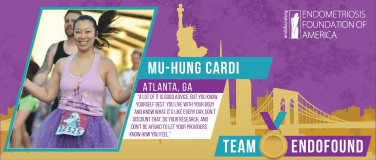
Izzy Daffern searched for answers to her symptoms for more than a decade. Now that she finally has them and her life is “more normal” than it was, she’s joined EndoFound’s Team EndoStrong for the New York City Marathon on Nov. 3.
“My broader goal for the marathon is to raise money and spread awareness about endometriosis through my networks and friends,” she said. “My personal goal is to prove to myself that I can do anything. My first long run of training was a 16-miler, and I did it while on my period.”
The race will cover the city’s five boroughs. EndoFound has been one of the marathon’s charity partners for ten years and is classified for the second year in a row as a bronze-level foundation by New York Road Runners. Daffern, a California native and Manhattan resident, is one of Team EndoStrong’s 50 runners aiming to collectively raise $250,000.

Click Here To Support Izzy's Marathon Fundraiser
Daffern started feeling symptoms in high school that included heavy periods, anxiety, mood swings, and skin problems. Her doctor put her on birth control, which seemed to work.
“Until about three years ago when I was in my office one day and collapsed,” Daffern said. “That’s what led me to find out that birth control was just a mask for bigger problems.”
Emergency room doctors assumed the issue was her appendix. It wasn’t, and multiple other tests they ran discovered nothing. Determined to find answers, Daffern called her OBGYN when she got home that day to schedule an ultrasound. The test revealed significant blood around her uterus from a ruptured cyst, which had essentially destroyed her left ovary. It was also the start of 367 consecutive days of bleeding.
“The bleeding was anything from resembling my menstrual period to spotting,” Daffern said. “I saw several doctors during that time and didn’t get many answers. Some said it was a case of my hormones changing and rejecting birth control. Others said it was just something that came with age. But I also had debilitating pelvic pain, lower back pain, and severe cramping.”
A doctor finally diagnosed Daffern in 2022 with endometriosis on her uterus, pelvis, and ovaries. It was the first time she’d heard of the disease. She was also diagnosed with anxiety and depression related to endo, along with premenstrual dysphoric disorder, which can cause numerous physical and emotional challenges. Daffern had endometriosis surgery in June 2023.
“My life is more normal than it has been, for sure,” Daffern said. “I’ve gone from missing four to five days of work a month to missing one or none. When I went back for a checkup in June, my doctor said she didn’t see that any endometriosis tissue had grown back.”
However, at that checkup, Daffern received two more diagnoses: polycystic ovary syndrome (PCOS), which can cause irregular periods, and infertility.
“My AMH levels [Anti-Müllerian hormone levels, which show how many eggs remain] were critically low. As a result, I decided to freeze my eggs this past June,” Daffern said. “I’ll be 28 this year, I’m single, and I just thought if I wanted the chance to have a family, this might be a good next step. They were only able to get two eggs; I think they normally like to get 12 to 16. But considering my condition, two is great.”
Her focus now is on the marathon. Daffern, a former competitive swimmer, ran a half marathon in London in 2017 and a half-marathon in Brooklyn this year, her first since the surgery.
“I did it because if you’d told me three years ago that I’d be able to run at all, even a mile, I’d have said you were joking because I couldn’t even get out of bed most days,” Daffern said. “After that race, I said, ‘You know what? If I can do that, then I can do the full marathon and raise money in the process.’”
Daffern works in the marketing department of a company that offers mental health services. Having this disease has helped her fellow employees understand what endometriosis can do to someone and offer empathy.
“Once I was diagnosed, I started talking about it more at work around both males and females, and now it’s just an open discussion,” Daffern said. “I can come into work and say, ‘I’m on my period today and may not have a great day.’ It also encourages people to ask me how I’m doing or open themselves up to things they’ve been diagnosed with.”
To donate to Izzy Daffern’s cause, visit https://give.endofound.org/fundraiser/5510477.









